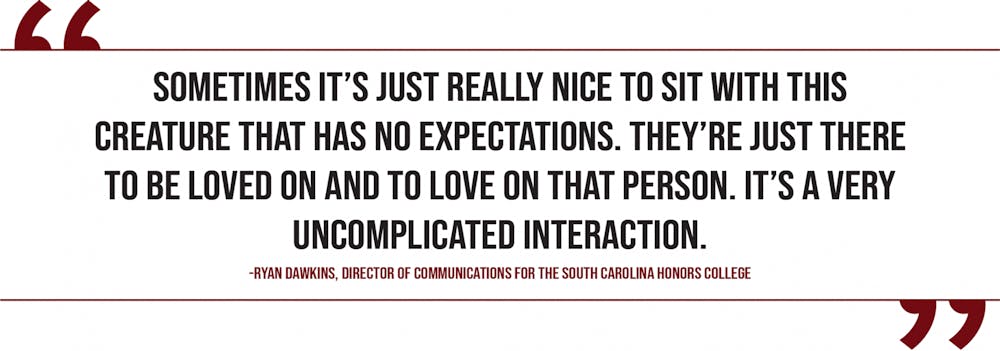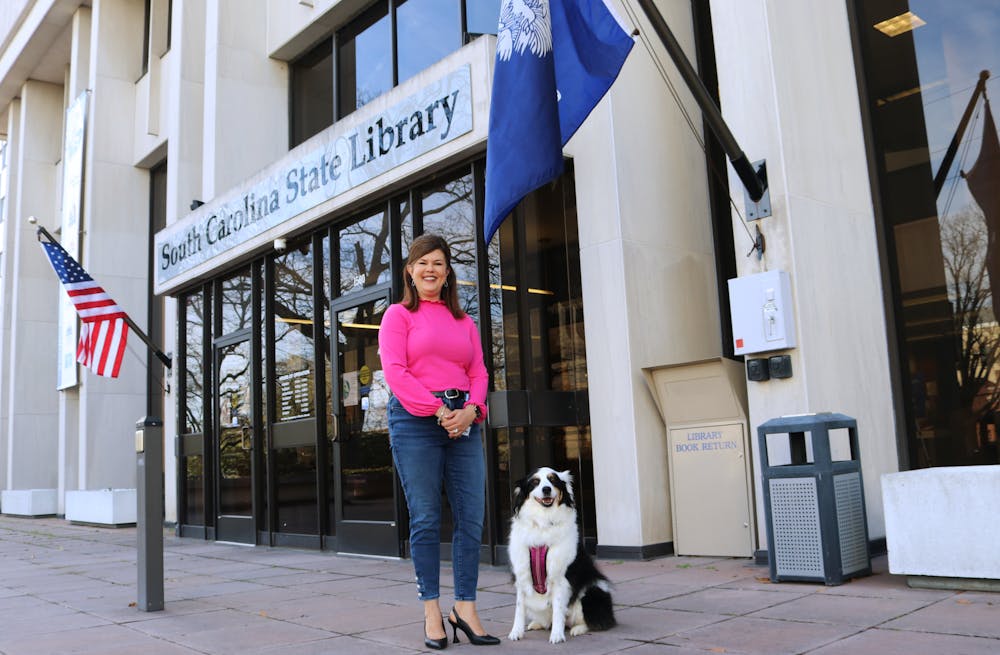College can be taxing on students’ mental health, but there are several therapy dogs on campus that can help alleviate the loneliness, stress and anxiety of college life.
George, Louie and Wally
Ryan Dawkins, the director of communications for the South Carolina Honors College, currently has three therapy dogs that visit weekly with the Honors College. George, a blind 7-year-old labrador retriever, Louie, a 6-year-old great pyrenees, and Wally, a 6-year-old pitbull dachshund mix, regularly visit students.
Although Dawkins loves all of her therapy dogs, she said that George is the perfect therapy dog and "he lives for that job." George is a rescue from the Newberry County animal shelter, and he hasn't let his blindness stop him from becoming a therapy dog. In fact, Dawkins said his blindness has made him more intuitive when it comes to comforting people.
"Sometimes I don't understand how he seems to know the things he knows," Dawkins said. "He kind of instinctively seems to know when someone needs to come to him versus when someone would rather have him plop in their lap like a big, giant bear."
All of Dawkins’ therapy dogs are trained and registered with Pet Partners of the Midlands. Pet Partners trains the dogs, as well as their handlers, to be prepared for any situation that could arise during their therapy work.
Dawkins said that even though “there’s no substitute for actual mental health care,” she has seen the effect therapy dogs have on students.
“(Students) are smart, ambitious — you put a lot of pressure on yourselves. And sometimes it’s just really nice to sit with this creature that has no expectations. They’re just there to be loved on and to love on that person. It’s a very uncomplicated interaction,” Dawkins said.

Sunny
Sunny’s personality is much like her name. Owner Kathryn Edwards said the 7-year-old golden retriever loves being around people.
“If someone smiles at her, something like that, she goes right over to say hello,” Edwards, who is also a history professor at USC, said.
Sunny is not only a certified therapy dog through Pet Partners of the Midlands but also is a working dog that assists FEMA and the Red Cross at disaster sites.
Edwards has been working with therapy dogs for almost two decades and has volunteered at senior centers, children’s hospitals, local libraries and USC.
Sunny also has regular office hours in Gambrell 206, visits Maxcy every other week and is stationed at the front of the Thomas Cooper Library during midterms and final exam week.
Edwards believes that Sunny’s calming and comforting presence helps to remind students of their own beloved pets.
“It’s a bit of home, a bit of normalcy in an environment that can seem very un-homey and un-normal to them,” Edwards said.
Katie
Ellen Dunn, the communications director at the South Carolina State Library, wanted to work with therapy dogs ever since she wrote a story about them when she was a reporter. Many years later, she found the perfect partner in Katie.
Katie is a 9-year-old Australian shepherd certified with Therapy Dogs International and Alliance of Therapy Dogs. Dunn started training with Katie when Katie was just 3 months old.
Before the pandemic, Dunn and Katie would frequently visit children at Prisma Health Baptist Hospital. Now, Katie mostly works at libraries and schools where children will read to her as a way of becoming more comfortable and confident in their reading skills.
At USC, Dunn visits U101 classes with Katie, where they talk to students about mental health. Dunn said U101 students are dealing with the stressors of adjusting to college life and that Katie helps them alleviate that stress.
“It makes us realize that the things that we stress over are not as big of a deal as we think they are,” Dunn said.
Dunn said working with Katie has helped with her own mental health, and that she considers it to be her true passion and purpose in life.
“When I think about what I’ve done in life ... what will be more important is the connections I’ve made with her (and) with people where I don’t remember their names, but I remember their story," Dunn said. "For that, there’s no greater gift."

